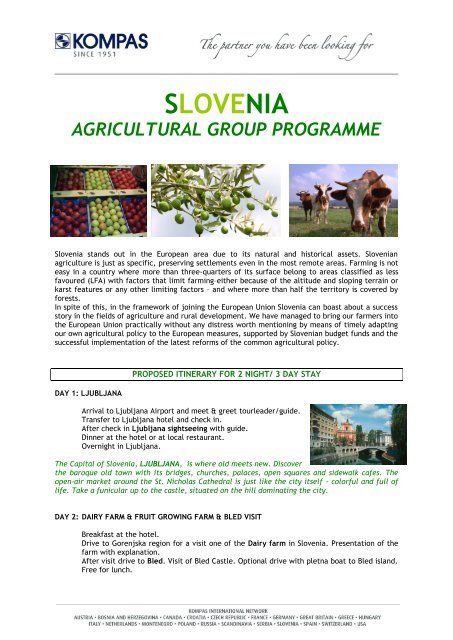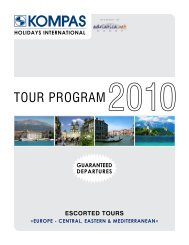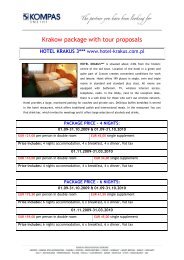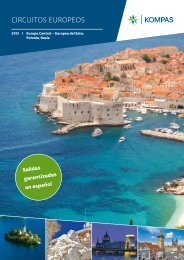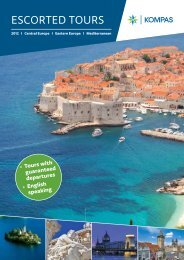slovenia agricultural group programme - Kompas
slovenia agricultural group programme - Kompas
slovenia agricultural group programme - Kompas
Create successful ePaper yourself
Turn your PDF publications into a flip-book with our unique Google optimized e-Paper software.
SLOVENIA<br />
AGRICULTURAL GROUP PROGRAMME<br />
Slovenia stands out in the European area due to its natural and historical assets. Slovenian<br />
agriculture is just as specific, preserving settlements even in the most remote areas. Farming is not<br />
easy in a country where more than three-quarters of its surface belong to areas classified as less<br />
favoured (LFA) with factors that limit farming–either because of the altitude and sloping terrain or<br />
karst features or any other limiting factors – and where more than half the territory is covered by<br />
forests.<br />
In spite of this, in the framework of joining the European Union Slovenia can boast about a success<br />
story in the fields of agriculture and rural development. We have managed to bring our farmers into<br />
the European Union practically without any distress worth mentioning by means of timely adapting<br />
our own <strong>agricultural</strong> policy to the European measures, supported by Slovenian budget funds and the<br />
successful implementation of the latest reforms of the common <strong>agricultural</strong> policy.<br />
DAY 1: LJUBLJANA<br />
PROPOSED ITINERARY FOR 2 NIGHT/ 3 DAY STAY<br />
Arrival to Ljubljana Airport and meet & greet tourleader/guide.<br />
Transfer to Ljubljana hotel and check in.<br />
After check in Ljubljana sightseeing with guide.<br />
Dinner at the hotel or at local restaurant.<br />
Overnight in Ljubljana.<br />
The Capital of Slovenia, LJUBLJANA, is where old meets new. Discover<br />
the baroque old town with its bridges, churches, palaces, open squares and sidewalk cafes. The<br />
open-air market around the St. Nicholas Cathedral is just like the city itself - colorful and full of<br />
life. Take a funicular up to the castle, situated on the hill dominating the city.<br />
DAY 2: DAIRY FARM & FRUIT GROWING FARM & BLED VISIT<br />
Breakfast at the hotel.<br />
Drive to Gorenjska region for a visit one of the Dairy farm in Slovenia. Presentation of the<br />
farm with explanation.<br />
After visit drive to Bled. Visit of Bled Castle. Optional drive with pletna boat to Bled island.<br />
Free for lunch.
Afer lunch drive to fruit growing farm, where professional visit of the orchard and liqueur<br />
and spirits making is presented. Possible also tasting of liqueur and spirits.<br />
Drive back to Ljubljana.<br />
Dinner at the hotel or at local restaurant.<br />
Overnight in Ljubljana.<br />
DAIRY FARM SEBAT has cca 60 cow and calves, they prodsuce cca 480.000 l of milk per year and<br />
have 62 ha of land. This is farm according to European standards with 40 year old tradition.<br />
With immense natural beauty, BLED, together with its surroundings, ranks<br />
among the most beautiful alpine resorts, renowned for its mild, healing<br />
climate and thermal lake water. The beauty of the mountains reflected on<br />
the lake, the sun, the serenity and the fresh air arouse pleasant feelings in<br />
visitors throughout the year, guaranteeing an ideal base or a relaxing break<br />
or an active holiday.<br />
FRUIT GROWING FARM JERALA is situated in Podbrezje, the heart of<br />
Gorenjska region. Their main branch is fruit growing, especially apples.<br />
For many years they have been involved in cultivation of <strong>agricultural</strong><br />
products. Noble traditional fruit harvesting, that has been passed from<br />
generation to generation, is being enriched with profits and experience<br />
of present time. They offer different varieties of apples, pears,<br />
potatoes and cabbage.<br />
From their harvest they produce high quality apple juice and apple vinegar, apple and pear dried<br />
friut, four types of liqueurs or spirits like fruit wine “Sadjevec”, “Tepkovec”and “Viljamovka”<br />
(liqueurs from piers).They won several awards and they also have certificate for Eco-farming.<br />
DAY 3: SLOVENE ISTRIA - OLIVE OIL PRODUCTION<br />
Breakfast at the hotel and check out.<br />
Drive to Slovene Istria. First visit of Tona’s house, a unique ethnological monument. It is<br />
build of stone and was once an olive oil press.<br />
Then proceed to visit Istranova where presentation of Istranova olive oil, symbolism of<br />
olive trees, olive oil press and oil use. Included olive oli tasting. Possible also lunch, snack<br />
and wine tasting.<br />
After lunch drive back to Ljubljana and to airport for homebound flight.<br />
The farmhouse at St. Peter – known as TONA’S HOUSE by the locals, was<br />
restored, and as a result, the characteristics of the Istrian rural<br />
architecture have been preserved, while the depiction of oil-making on<br />
its ground floor, as well as the rural kitchen and the bedroom on the<br />
upper floor, represent a way of life on the Istrian farmer in the past.<br />
ISTRANOVA extra virgin olive oil is a natural source of health and well<br />
being, produced from the olives of Istria, hand picked and cold pressed the<br />
very same day. Its regular consumption provides the body with vital<br />
substances the cells need for growth and effective regeneration. Its<br />
exceptional and strong taste is a sign of the oil’s purity and natural origin.<br />
Closed on Mondays;
PROPOSED ITINERARY FOR 3 NIGHT/ 4 DAY STAY<br />
DAY 1: LJUBLJANA<br />
Arrival to Ljubljana Airport and meet & greet tourleader/guide.<br />
Transfer to Ljubljana hotel and check in.<br />
After check in Ljubljana sightseeing with guide.<br />
Dinner at the hotel or at local restaurant.<br />
Overnight in Ljubljana.<br />
The Capital of Slovenia, LJUBLJANA, is where old meets new. Discover<br />
the baroque old town with its bridges, churches, palaces, open squares and sidewalk cafes. The<br />
open-air market around the St. Nicholas Cathedral is just like the city itself - colorful and full of<br />
life. Take a funicular up to the castle, situated on the hill dominating the city.<br />
DAY 2: DAIRY FARM & FRUIT GROWING FARM & BLED VISIT<br />
Breakfast at the hotel.<br />
Drive to Gorenjska region for a visit one of the Dairy farm in Slovenia. Presentation of the<br />
farm with explanation.<br />
After visit drive to Bled. Visit of Bled Castle. Optional drive with pletna boat to Bled island.<br />
Free for lunch.<br />
Afer lunch drive to fruit growing farm, where professional visit of the orchard and liqueur<br />
and spirits making is presented. Possible also tasting of liqueur and spirits.<br />
Drive back to Ljubljana.<br />
Dinner at the hotel or at local restaurant.<br />
Overnight in Ljubljana.<br />
DAIRY FARM SEBAT has cca 60 cow and calves, they prodsuce cca 480.000 l of milk per year and<br />
have 62 ha of land. This is farm according to European standards with 40 year old tradition.<br />
With immense natural beauty, BLED, together with its surroundings, ranks<br />
among the most beautiful alpine resorts, renowned for its mild, healing<br />
climate and thermal lake water. The beauty of the mountains reflected on<br />
the lake, the sun, the serenity and the fresh air arouse pleasant feelings in<br />
visitors throughout the year, guaranteeing an ideal base or a relaxing break<br />
or an active holiday.<br />
FRUIT GROWING FARM JERALA is situated in Podbrezje, the heart of<br />
Gorenjska region. Their main branch is fruit growing, especially apples.<br />
For many years they have been involved in cultivation of <strong>agricultural</strong><br />
products. Noble traditional fruit harvesting, that has been passed from<br />
generation to generation, is being enriched with profits and experience<br />
of present time. They offer different varieties of apples, pears,<br />
potatoes and cabbage.<br />
From their harvest they produce high quality apple juice and apple vinegar, apple and pear dried<br />
friut, four types of liqueurs or spirits like fruit wine “Sadjevec”, “Tepkovec”and “Viljamovka”<br />
(liqueurs from piers).They won several awards and they also have certificate for Eco-farming.
DAY 3: SLOVENE ISTRIA - OLIVE OIL PRODUCTION & PROSCIUTTO<br />
Breakfast at the hotel.<br />
Drive to Lokev for visit of the oldes Prosciutto farm in the Slovenian Karst region.<br />
Professional introduction of prosciutto making with tasting.<br />
After visit drive to Slovene Istria. First visit of Tona’s house, a unique ethnological<br />
monument. It is build of stone and was once an olive oil press.<br />
Then proceed to visit Istranova where presentation of Istranova olive oil, symbolism of<br />
olive trees, olive oil press and oil use. Included olive oli tasting. Possible also lunch, snack<br />
and wine tasting.<br />
Drive back to Ljubljana.<br />
Dinner at the hotel or at local restaurant.<br />
Overnight in Ljubljana.<br />
PROSCIUTTO FARM LOKEV on Krasu is considered to be the oldest<br />
prosciutto producer in the Slovene Karst region. They offer first class<br />
Karst meat products that can be recognized for their geographical and<br />
cul inary tradition. Guests are shown the production process of the<br />
Karst prosciutto. They present the entire process from fresh pork thighs<br />
to Karst prosciutto. Experts will lead the visitors through the spacious<br />
drying room and explain the process as they move along. Under the<br />
influence of the events the visitors are seated in a comfortable courtyard, which radiates a<br />
magical Karst ambience. Here or in the authentic Karst room they prepare first class tasting<br />
sessions for our visitors, sessions that are a combination of delicious meat products dried in the<br />
Karst wind, home made Teran wine and an unforgettable Karst atmosphere.<br />
Closed on Sundays;<br />
The Slovenian Istria or the Slovenian Tuscany is a very diverse territory, spreading from the Karst<br />
Edge area in the east to the coast and the sea to the west and the river Dragonja in the south.<br />
Long culinary tradition, superior and friendly locals provide these old, fascinating villages in the<br />
Šavrin hills with a special charm of a rich natural and cultural heritage.<br />
The farmhouse at St. Peter – known as TONA’S HOUSE by the locals, was<br />
restored, and as a result, the characteristics of the Istrian rural<br />
architecture have been preserved, while the depiction of oil-making on<br />
its ground floor, as well as the rural kitchen and the bedroom on the<br />
upper floor, represent a way of life on the Istrian farmer in the past<br />
ISTRANOVA extra virgin olive oil is a natural source of health and well<br />
being, produced from the olives of Istria, hand picked and cold pressed the<br />
very same day. Its regular consumption provides the body with vital<br />
substances the cells need for growth and effective regeneration. Its<br />
exceptional and strong taste is a sign of the oil’s purity and natural origin.<br />
Closed on Mondays;<br />
DAY 4: WINE FARM & TOURIST FARM<br />
Breakfast at the hotel and check out.<br />
Drive to Bela Krajina for visit of local Wine farm. Presentation and wine tasting.<br />
Drive back to Ljubljana, in Dol stop on tourist farm PR’ KRAC. Farm presentation and<br />
lunch.<br />
After visit in the afternoon drive to the airport for homebound flight.
Viticulture and winemaking has existed in this region since the time of the Celts and Illyrians<br />
tribes, long before the Romans would introduce winemaking to the lands of France, Spain and<br />
Germany. Today Slovenia has more than 40,000 wineries making 1 million hl (26.4 million gallons)<br />
annually from the country's 24,600 ha (59,300 acres) of vineyards.<br />
TOURIST FARM PR’KRAC is ecological farm. For many years they have been<br />
involved with tourism. Homemade production includes cereals, vegetables,<br />
and fruits. They are producing homemade apple juice, vinegar, spirits and<br />
other homemade products. They have cows, goats, pigs and horses.<br />
Contact us also for 7 night/ 8 day itinerary...<br />
ISTRIAN CATTLE BOSKARINI<br />
OTHER POSSIBLE VISITS<br />
Visit to Croatian Istra (near the boarder) to visit Boskarini.<br />
Boskarini are typical Istrian cattle, originated in Ukraine. There<br />
used to be over 30.000 of them in Istria. After World War 2 experts<br />
began to breed them again. They are very intelligent cattle,<br />
therefore suitable for field work, and they have excellent meat.<br />
POULTRY FARMING<br />
Visit of the Jata Emona.<br />
Agriculture: Production and distribution of feeds; wholesale of grains,<br />
seeds and feeds; production and distribution of table and hatching eggs;<br />
poultry rearing and sales<br />
This industry comprises establishments primarily engaged in raising<br />
chickens for egg production. The eggs produced may be for use as table<br />
eggs or hatching eggs.<br />
APICULTURE<br />
Visit of the Museum of Apiculture in Radovljica, which displays the rich tradition of Slovenian<br />
apiculture or beekeeping which was an important branch of agriculture in the 18th and 19th<br />
centuries. The technical section of the museum shows the most typical habitats of bees and<br />
apicultural tools, the biological room highlights the life and work of the autochthonous bee<br />
kranjska sivka (apis mellifera carnica), the art exhibition features a unique Slovenian folk art,<br />
painted beehive front boards.<br />
Possible also visit of the beekeeper.
POTATOE AND ONION FARM<br />
Farm visit of family farm that engages in potato and onion<br />
production. They have cca 37 ha filed. They will explain about<br />
production, cleaning and packing.<br />
CULTIOVATION OF HOPS<br />
Hops are beautiful, fast-growing, perennial vines best known for<br />
their profuse, light green, fragrant flowers that are used for making<br />
beer. With their large and attractive flowers and large, dark green<br />
foliage, Hop plants also make attractive ornamentals and quickly<br />
cover a fence or wall. As with all perennial vines, Hops die back in<br />
the winter and come back in the spring. There are two types of<br />
hops used for brewing. Aroma hops are lower in alpha-acids and are<br />
used for conditioning and finishing. Bittering hops are higher in<br />
alpha-acids percentages and are used to add bitterness and for<br />
finishing and conditioning.<br />
TROUT BREEDING FARM<br />
Possible to se fish farm and hatchery. Visit takes 1,5 hrs.<br />
On this fish farm they have 12.000 fishes at once in fish farm. They<br />
have tribal flock of “Soča” trouts and umber.<br />
At the hatchery they take 1,5 MIO roes per year.


